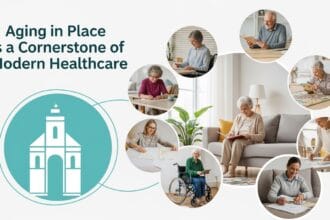For many years you may feel that your parents are “slipping away” before your very eyes. But you always think to yourself, “When he/she gets worse, I’ll worry about it then. But for now, it’s OK.”
But the real question is when is the right time to seriously discuss it? How do you know if it’s not OK and it’s time to take action?
Good question, and in this article we’re going to talk about seven different options for elderly care as well as a reminder of what could go wrong if your decision is too hasty.
1. Senior Housing Community
Also known as an independent living community, these apartments or townhomes are made for elderly residents with some degree of independence. They may have special provisions like bathroom rails and tub chairs, as well as an emergency calling system.
But apart from these provisions, they are somewhat normal apartments for elders who don’t need constant care. Seniors may feel safer in a community of their own contemporaries and may also enjoy socializing with neighbors. They also want their independence, even though they may appreciate discounts on rent, or other amenities exclusively available to tenants.
This is a fine option if there are no major medical issues affecting your elderly relative.
2. Assisted Living Community
An assisted living community is a facility built to handle a few residents at a time, each with their own private room, and with daily living assistance. This is not the same thing as a nursing home since these facilities don’t have a medical staff on hand. Rather, they have staff members that come and go throughout the day and help residents with daily activities.
These daily activities might include cooking, driving and doing errands, housekeeping, laundry, and on-call emergency services. Residents can also look forward to communal dining and recreational programs to keep them active and happy.
This choice is ideal for residents who have trouble throughout the day operating a vehicle, a stove, or cleaning, or performing other basic living activities. They don’t need constant supervision but do need some help now and then.
3. Nursing Home
Also called a Long-Term Care facility, this option offers constant 24-7 staff care, with residents staying in a private or even shared room. Not only is a nurse on hand, (and a doctor on call) but residents will often require assistance getting up and walking around, eating, bathing, and using the restroom.
This option is best for any resident who is prone to falling, needs help throughout the day and night, and who may be experiencing dementia. Some facilities are also equipped with strictures and security features to prevent elderly patients from getting lost, wandering away, or injuring themselves.
Is a nursing home always the best option? Surprisingly, no. Not always! Did you know, for instance, that about half of all residents living in nursing homes will fall, and in some cases, fall more than once a year?
It really depends on reputation and the conscientiousness of staff members.
4. Home Health Care
Some elderly persons could afford to stay in their home and hire a home health care assistant to drop in or stay for a few hours a day. In some cases, the resident may need a live-in assistant.
Home health care may also include modifying the house (like adding fixtures for the disabled) and paying the assistant or nurse to come in and spend time with the resident.
This option is best for someone that needs constant or periodic help throughout the day but does not want to stay in a multi-room facility.
In some cases, the resident may not need to hire an assistant, if family members can take turns and rotate day or night shifts. It’s usually an issue of affordability and the willingness of the extended family to help.
5. Short Term Stay or Adult Day Cares
These facilities may have medical provisions, or may be more like an Assisted Living facility, but they are only used for short-term visits. For instance, if a resident needs to recuperate after surgery or an injury, this would be an ideal arrangement.
This short-term option could also be considered if a family member just needs a break but will return to full-time care at some point.
6. Hospice Care
Hospice care is only for patients who require end-of-life care. When a person is terminally ill the focus is on making them as comfortable as possible, and letting them keep their dignity. As the disease progresses, the patient will require more and more daily assistance.
Nursing Homes Can Be Neglectful or Even Abusive
Of course, no one wants to think about putting a parent in a nursing home and may feel very sentimental about taking care of them.
But at the same time, unsupervised seniors are at a greater risk of personal injury without constant attention. Can you afford to leave your loved one unsupervised?
Even worse, we know that one in ten seniors has reported experiencing abuse or neglect from staff members, according to the CDC.
In some cases, you may have to contact a lawyer if you suspect elderly abuse or neglect. An experienced attorney can help with filing nursing home injury claims or even taking a case to court.
Ask Yourself Important Questions Today
Is the facility you’re choosing equipped to protect seniors? Is the nursing staff trained to help seniors, including those who are prone to fall, or who may get injured performing daily activities?
The best thing to do is to research any facility you’re considering by name, reputation, and user rating. Try to find accredited, certified and licensed agencies and facilities and do note their history.
The National Institute on Aging wrote a helpful guide on what other questions to consider before you make a final decision.
What matters is that your aging relative gets all the help they need at this critical time in their life!
Do they need constant care to avoid further injury? Do they need a community of friends for support? These are the issues to think about as you plan for the future today.









